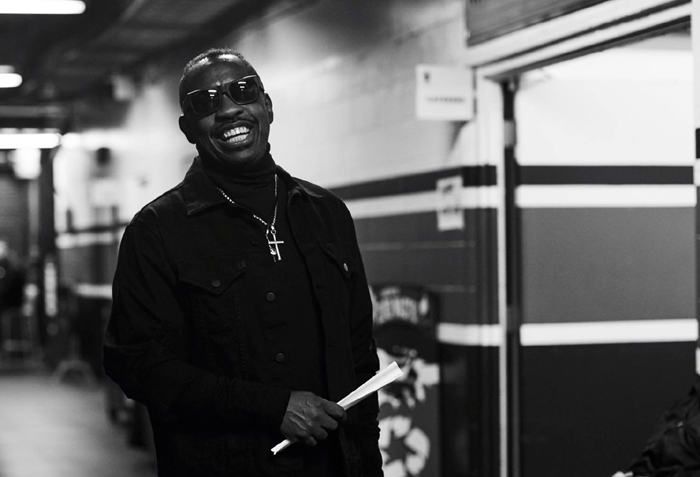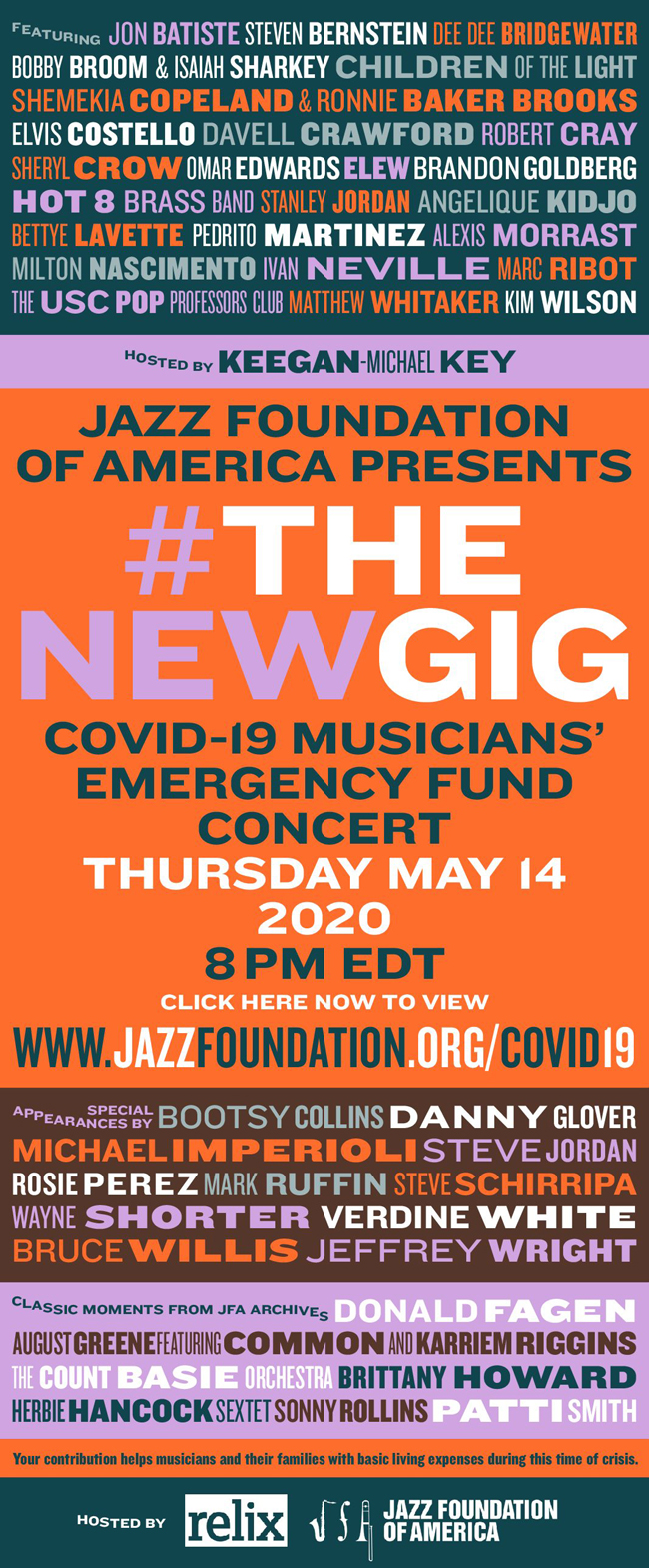Steve Jordan Lands #TheNewGig: the Jazz Foundation of America’s All-Star Livestream Benefit

The Jazz Foundation of America is a charitable organization committed to “saving blues, jazz and roots, one musician at a time.” On Thursday, May 14, the JFA will enter the livestream realm to further this mission through an all-star online benefit dubbed #TheNewGig. Keegan-Michael Key will host the event, which will raise money for the Foundation’s COVID-19 Musicians’ Emergency Fund designed “to help musicians and families affected by the pandemic by covering basic living expenses.”
#TheNewGig will feature appearances by Jon Batiste, Bettye LaVette, Robert Cray, Shemekia Copland, Elvis Costello, Sheryl Crow, Ivan Neville, Angelique Kidjo, Dee Dee Bridgewater and many others. The night also will include archival performances from the Foundation’s annual fundraiser A Great Night in Harlem, with Sonny Rollins, Brittany Howard, Herbie Hancock, Donald Fagen and Patti Smith, among the participants.
Steve Jordan will run point on Thursday as the #TheNewGig’s event’s musical director. He currently serves as the Artistic Director of the JFA alongside his wife (and fellow bandmate in The Verbs) Meegan Voss.
The show will be streamed on the Relix YouTube channel on May 14 at 8 p.m. ET, with a 10 p.m. ET rebroadcast.
Can you talk about the scope of the Foundation and the range of musicians who are assisted by it.
We work with a wide range of musicians, not just jazz and blues musicians, but musicians of all ilk because as Louis Armstrong and Duke Ellington both said, “There’s only two kinds of music: good music and bad music.” Most musicians worth their weight can play most anything as long as it comes from the heart and soul.
The Foundation itself takes care of a wide range of people. We create jobs through the Gig Fund, which is a program in which we actually give money to players who are in need by creating jobs for them to play. We have another grant for musicians who play for people in hospitals and nursing homes. We have another program called Jazz and Blues in the Schools, where musicians go to schools to teach kids who have never heard jazz and blues before and get an appreciation of it. We’ve done that in New Orleans, New York, all over the country—it’s a fantastic program. So there’s a wide range of initiatives that we have in place that create jobs for musicians and have an educational message.
What led to your involvement with the organization?
I was putting on a concert that was supposed to be a birthday celebration for Hubert Sumlin’s 80th birthday. Unfortunately, he passed away about a month and a half before he turned 80, so we thought we would turn the birthday party into a celebration of his life. It was supposed to be underwritten by another foundation but that foundation did not have a license to have a fundraiser in the state of New York.
That’s when I was told about the Jazz Foundation of America, which I had never heard of. When I started to find out more about the Foundation, I thought. “Wow, this is the best kept secret in America.” I was amazed by all the programs that they had implemented and all the people that they helped through the years—people like Abbey Lincoln, Odetta and Clark Terry. There are also a lot of people they take care of that the public doesn’t know about because of the wonderful discretion that they have about keeping people’s business private.
So I decided to work with them on this particular program. The Jazz Foundation underwrote it and we had an incredible show. It was with Keith Richards, Eric Clapton, Buddy Guy, Gary Clark Jr., Derek Trucks, Doyle Bramhall. You name it, everyone was on it. It was a bang up show. It’s always great to throw a show at the Apollo Theater and we also were able to get in touch with some of the players who played on some of the original Howlin’ Wolf stuff. So we had people from Chicago and friends of Hubert, that was the main thing. We put together an all-star band and it was just a wonderful evening. We raised over $1 million that night.
A little while later I went to an event where I saw a very close friend of mine, a person I considered my brother. He had developed cancer and it obviously had curtailed his work. I had been wondering how he was managing but he was very private about so I didn’t want to pry. Then I learned that the Jazz Foundation was sustaining him and that to me was incredible because they didn’t let on that they were doing it. I thought that was pretty amazing because most organizations of this caliber like to advertise who they’re taking care of. It’s completely the opposite with this foundation.
So that was the thing that really attracted me and I talked to Meegan about doing some more work with the Foundation. We have a lot of friends who are either getting up in age or have fallen on hard times because the music business is so volatile. The Foundation has been able to help people in need—there’s not a lot of red tape with this organization so people get help pretty quickly. That’s important as well.
Another thing that attracted me to the Foundation is all the good people who are part of it, like Richard Parsons, the chairman, Wendy Oxenhorn, the longtime executive director, Joe Petrucelli, the new executive director and Jarrett Lillian, our president. So you have a real family type of vibe and the social workers are great—Alisa Hafkin, Melaney Mashburn and Will Glass. That also makes it fun to work in this environment.
The Jazz Foundation of America hosts its annual “A Great Night in Harlem” fundraising gala every spring. What is that state of the gala? Will this livestream take place in lieu of it for 2020 or complement it?
This is a completely separate event to deal with the hardships that impact musical communities due to the COVID-19 pandemic. It’s going to complement the gala because we’ve postponed it. Our gala was going to be on April 14th where we were going to honor Carlos Santana and Buddy Guy. We’ve rescheduled it for the fall, depending on the reach of the pandemic and whether we’re surging or we’re on the decline. We’ll see. Whatever is safe. We’re not putting people at risk and then we’re going to follow all guidelines.
You’ve served as musical director for numerous live events over the years, including the Foundation gala. How will you approach the livestream?
With a live show you have the ability to run over timewise. Luckily, I’ve been working in television for many years so this is basically like a television show. I have a finite amount of time to work with. You’re in trouble if you don’t have enough content to fill the time and you’re in trouble if you have too much. Right now we’re on the border of having too much, which is a good thing.
We’re putting together a really fine concert which consists of some household names, some people that you’ve never heard of, some up-and-coming people and then some previously in-the-can performances that took place at the Apollo. We filed away those performances for archival purposes, never for television but this is a new frontier, a dire situation. So we decided that we wanted to show the world some of these performances and if it helps us raise more money, then that’s the right thing to do. The musicians have been gracious enough to sign off on that because this is for a good cause, even though some of these people are very particular about their performances. It’s a whole different vibe because when you’re doing a live show and you know that it’s not going to be broadcast in any way, you tend to be a little bit more loose, a little bit more relaxed. Whereas if it’s a television show you’re a little bit more on edge.
So the performances we’re going to share have a different vibe than if it were just a television show. People are a little bit looser and it’s a little bit more fun. This also is going to be a rare thing where you’re getting to see something that otherwise you would have had to be there to see. It’s only going be up for 24 hours and then that’s it.
Can you name a few of the unheralded musicians that people shouldn’t miss?
We have a few kids that we’ve had at previous events—they’ve grown up a little but they’re still kids to me. People like Matthew Whitaker are going to perform. He’s a great piano player and keyboard player, who’s also a great multi-instrumentalist but his main thing is piano and organs. Another kid we’ve been working with for years is Brandon Goldberg. A wonderful singer named Alexis Morrast also will be performing, She’s really fantastic, kind of a prodigy. Those are some of the young ‘uns we have that I think will surprise people.
#TheNewgig will appear on the Relix Channel, which recently streamed the BB King tribute, another event in which you were the musical director. What are your memories of that night?
The Capitol Theatre is a great place to play and what an audience that was. I mean, they were ready to go, couldn’t get enough of the music and it was a wonderful experience. I felt B.B. King in the house that night for sure. It also was great working with Pete [Shapiro] on it. He’s just so enthusiastic about music. That’s what you need and it’s a change of pace. Not all promoters or club owners are that enthusiastic about music, they’re more enthusiastic about the bottom line. So when you have someone like Pete who really loves the music and will do anything for it, that’s a great thing.
That night was a great tribute in front of a loving audience and it was pure fun. I also got to see old friends—one of my favorite moments was being backstage with Buddy Guy, William Bell and Bobby Rush while the three of them were talking to one another and having a good time. I was so happy being in their presence while they were communing. It was fantastic.
I think it’s great that Thursday’s event will be streamed on Relix because it’s going to get this music to a different demographic. It will turn a whole lot of people onto these musicians, so we’re really excited about it.





















